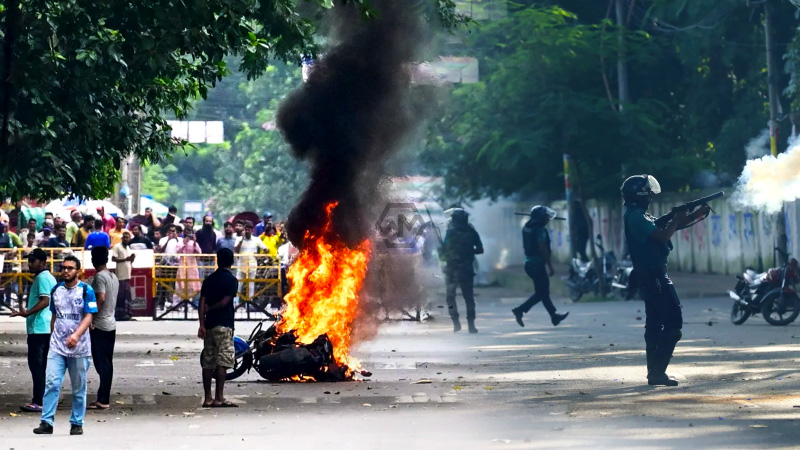- Fatal Clashes: At least 16 deaths amid violent protests against 30% job quota.
- Government Response: Internet shutdowns and riot police deployed to control unrest.
- International Concern: Embassies issue advisories; calls for peaceful resolution grow.
The anti-quota protests in Bangladesh have escalated into deadly clashes, claiming the lives of at least 16 people as demonstrators clash with riot police in Dhaka and other cities. The protests, fueled by frustration over high youth unemployment and a controversial 30% job quota for descendants of 1971 war veterans, have led to widespread violence and disruption.
International concern has mounted, with the U.S. and Indian embassies advising citizens to avoid demonstrations. Rights groups and global bodies like Amnesty International and the United Nations have called on Bangladesh to protect the rights of peaceful protesters and find a peaceful resolution to the crisis.
“Bangladesh Unrest: Youth Protests and Government Response”
In Bangladesh, protests over a government job quota policy have turned deadly, with clashes resulting in at least 16 fatalities and hundreds injured. The demonstrations, driven by frustration over high youth unemployment and objections to a 30% job reservation for descendants of 1971 war veterans, have seen violent confrontations between students armed with rocks and sticks and riot police armed with tear gas and rubber bullets.
Despite attempts by the government to stem the unrest through temporary internet shutdowns and increased security measures, including the closure of universities and deployment of paramilitary forces, the situation remains volatile. The government has expressed willingness to engage in dialogue with protesters, although initial attempts were rebuffed by protest leaders who cited ongoing violence as a barrier to meaningful discussions.
International concern has mounted, with diplomatic missions urging restraint and advocating for peaceful resolution of the crisis. As the country braces for a Supreme Court hearing on the quota policy, scheduled for August 7, there is hope that judicial intervention may provide a path towards addressing the grievances fueling the unrest.
The ongoing protests in Bangladesh underscore deep-seated frustrations over economic opportunities and government policies, with tragic consequences. As stakeholders navigate these turbulent times, the importance of dialogue, respect for human rights, and a commitment to peaceful resolution cannot be overstated in achieving lasting stability and justice.
“The government’s willingness to talk must be met with genuine dialogue, not further violence.”



